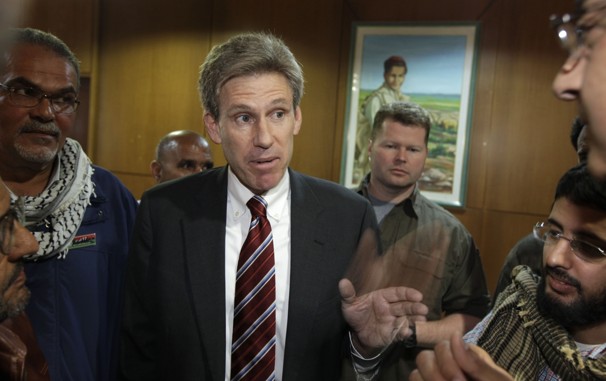
U.S. Ambassador Chris Stevens speaks to local media on April 11, 2011 in Libya.
Protests in Libya brought on by an obscure U.S. film that ridiculed Islam’s prophet Muhammad, escalated into a fiery attack on the U.S. Consulate in Benghazi. One protest resulted in the killing of four Americans, among them U.S. Ambassador to Libya John Christopher “Chris” Stevens.
In a statement released today, President Barack Obama vowed to bring the killers to justice and to increase security at diplomatic posts around the world, condemning the killings and acknowledging the Ambassador and his staff for standing up “for freedom and human dignity.”
Ambassdor Chris Stevens is the first U.S. diplomat to die in the line of duty since 1979. Sean Smith, a Foreign Service Information Management Officer was also among the causalities. Libya’s interim president, Mohammed el-Megarif, apologized and called the attack on the consulate “cowardly” and vowed to bring those responsible to justice.
Stevens and a group of embassy employees died as they went to the consulate in efforts to evacuate staff when hundreds of people opened fire with machine guns and rocket-propelled grenades. Much of the building was burned and trashed after the attack. As of Wednesday, information regarding the assault was still surfacing.
The anti-Islamist film, created by an Israeli filmmaker living in California, sparked anger after excerpts of the film ridiculing Islam’s Prophet Muhammad as a fraud and womanizer appeared on YouTube.
On Tuesday, riot police stood by the U.S. Embassy in Cairo, Egypt, as crowds climbed the walls and tore down an American flag, replacing it with a black Islamist flag. Although not deadly, the assault on the U.S. Embassy was the first to occur in the country’s history.
-Juan Frausto
(Photo credit: Ben Curtis)
Think people should hear about this?